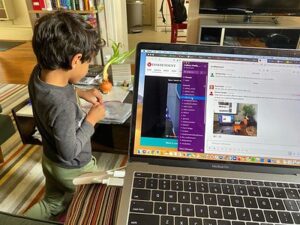Earlier this week, the presidents of Michigan State University and Wayne State University indicated that their faculties are preparing to deliver the fall semester online. Although the universities have not made a final decision, both presidents said that they doubted that the universities could conduct in-person classes. UM president Mark Schlissel said that the University is “hoping to have a fall semester.”
The three largest universities in Michigan have said that they will experience varying degrees of financial loss related to the COVID-19 pandemic. UM expects to lose between $400M and $1B this fiscal year. MSU has already experienced $50M in losses. WSU did not provide a dollar figure on either its actual or expected losses. Stalled research programs, sporting event cancellations, television revenues and housing refunds account for much of the losses.
Despite the challenges, MSU expects to see an increase in its fall 2020 enrollment. In an email update earlier this month, MSU’s Director of Undergraduate Admissions, John Ambrose, said that the university has received a higher number of fall 2020 applications. He also said that the university is offering more than $600M in financial aid to students. Enrollment deposits at MSU have risen compared to last year at this time. MSU offered fall admission to more than 33,200 students. That’s a 5.4% increase over last year’s admitted class of 31,500. Of those admitted last year, about 8,500 ultimately enrolled.
COVID-19 will pose challenges for foreseeable future
Michigan’s three largest universities do not think they can safely offer in-person classes in the fall. Part of their challenge is controlling their environments. While they can control the classroom and laboratory buildings, they cannot control what happens when their students leave campus. Many students live in off-campus housing. They could easily bring the virus back to campus with them daily.
Some infectious disease experts say it may be impossible to develop an effective COVID-19 vaccine. To date, no one has produced a coronavirus vaccine. Until recently, doctors did not think coronaviruses posed any significant danger to humans. However, recently emerged strains have produced Sudden Acute Respiratory Syndrome (SARS) and Middle East Respiratory Syndrome (MERS), both of which can kill humans.
These signs point to a diminishing likelihood that WCC can safely offer either summer contract training or in-person classes in the fall. While this has revenue implications for the College, it also deals a significant setback to students in vocational and occupational programs. Delivering transfer courses online is comparatively easy. Providing vocational and occupational education online is not. In addition to traditional students, these classes attract a significant number of WTMC students. For WTMC students, the impact is doubled. They can neither complete their high school diploma nor their required degree or certificate program. They’re simply being left to wait out the pandemic.
The “solution” the WCC administration provided this semester was to pass out incompletes to students in lab classes. This is wholly inadequate because it merely creates a larger problem for these students down the road. Instead of demanding that all WCC faculty use Blackboard’s gradebook, the Trustees should insist that the Administration develop a viable solution for the thousands of vocational and occupational students it stranded this semester.
Photo Credit: Peter Miller , via Flickr




















